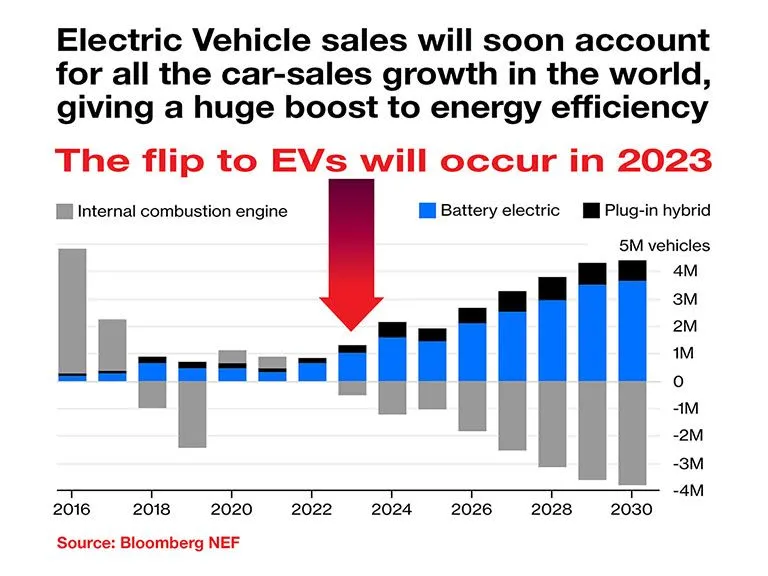
Bloomberg forecasts EV sales will overtake gas cars in 2038 and provide huge energy efficiency
Electric Vehicles Mean More Power to You. They will soon account for all the car-sales growth in the world, giving a huge boost to energy efficiency.
By Liam Denning / Bloomberg Opinion / 5/15/2019
Bloomberg NEF forecasts sales of electric passenger vehicles – mostly all-electric but including plug-in hybrids – to overtake sales of those running solely on internal combustion engines in 2038. That sounds like a long way off, but it’s as far from today as today was from 2000. Moreover, regular readers will know I don’t attach much importance to that crossover year anyway.
When it comes to consumer products, I think the real tipping point will arrive when electric vehicles start to account for the majority of the growth in the global vehicle market. Attention and investment have a thing about growth, even when it starts from a small base; that’s how s-curves get going and we end up with all manner of cool stuff that now seems commonplace (think about that cellphone you were using and that behemoth TV you were watching in 2000).
Electric vehicles, or EVs, actually accounted for all the growth last year and look set to do the same this year. Before you get too excited, though, that owes at least something to a cyclical dip in car sales overall. Still, Bloomberg NEF’s forecasts imply hybrid and pure EVs overtaking traditional passenger vehicles in terms of marginal change, consistently, starting… next year. Pure EVs alone claim that prize in 2022. Just as growth attracts money, plateaus or peaks tend to discourage it, which is why automakers are pouring money into developing electric drive-trains even though the regular kind will still account for the majority of sales for years to come.
Electric and hybrid models are forecast to account for all the growth in global passenger vehicle sales from 2023, implying a peak for traditional vehicles.
The second point regards how all those vehicles are powered. Bloomberg NEF calculates the increase in the global EV fleet adds up to an extra 2,259 Terawatt hours of electricity consumption by 2040. That’s equivalent to about 60% of all the electricity the U.S. consumes today (zero-growth utilities should be promoting the hell out of EVs). So it’s a lot and yet, actually, not that much in global terms; maybe 7% of projected global electricity demand in 2040. Meanwhile, the amount of oil consumption displaced by all those plugged-in wheels is estimated at 13.7 million barrels a day by 2040, or more than all the crude oil pumped today by the world’s biggest producer, the U.S.
What’s interesting about those two numbers is what’s missing.
All those extra electrons add up, on an oil-equivalent basis, to only 3.6 million barrels a day. Under these assumptions, about 10 million barrels a day of oil demand – roughly what Saudi Arabia produces now – isn’t merely switched into another form of energy. It’s just gone. Such is the power of efficiency. EVs convert a far higher proportion of the energy from the socket to power their wheels than a conventional vehicle does. The Department of Energy puts it at about 60% for EVs versus about 20% for internal combustion engines.
This gets to a big implication of a more electrified society versus a more mechanical one. Thermal energy generates a lot of waste in the form of heat. Only about one in four or five of those gallons of gasoline you pump and pay for provide energy you actually use, and perhaps 60-70% of what statisticians call the world’s primary energy use is really just waste.
Of course, it matters where the electrons going into an EV come from; coal-fired power is, apart from highly polluting, less than 40% efficient on average. Still, even if one assumed all that electric power in Bloomberg NEF’s calculation was coming from thermal sources and we lost 6% in transmission, it would still add up to only 10 million barrels a day in oil terms. The efficiency gain is overwhelming.
Plus, we don’t use only thermal power sources today, and the increasing penetration of renewable energy means we will likely use far less by 2040. The changing energy mix means less waste. And the electric vehicle’s ability to plug into that is perhaps its strongest selling point.
Liam Denning / Bloomberg Opinion / 5/15/2019
https://www.bloomberg.com/opinion/articles/2019-05-15/electric-vehicles-are-overwhelmingly-more-energy-efficient
Recent Posts
- The 2022 Audi Q4 e-Tron SUV combines performance, practicality and luxury
- Ford's 2022 F150 Lightning All-Electric Truck is in high demand
- Legendary Audi performance is at the heart of the 2022 Audi e-tron GT and its RS sibling.
- Meet the Lexus RZ 450e – the luxury brand’s 1st EV
- The 2022 GV60 is Genesis’ first all-electric vehicle

